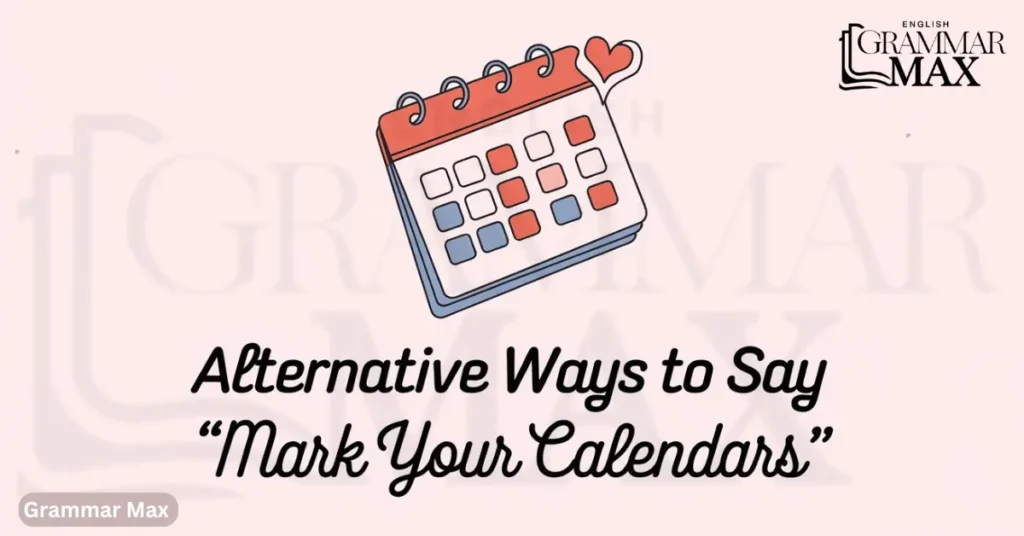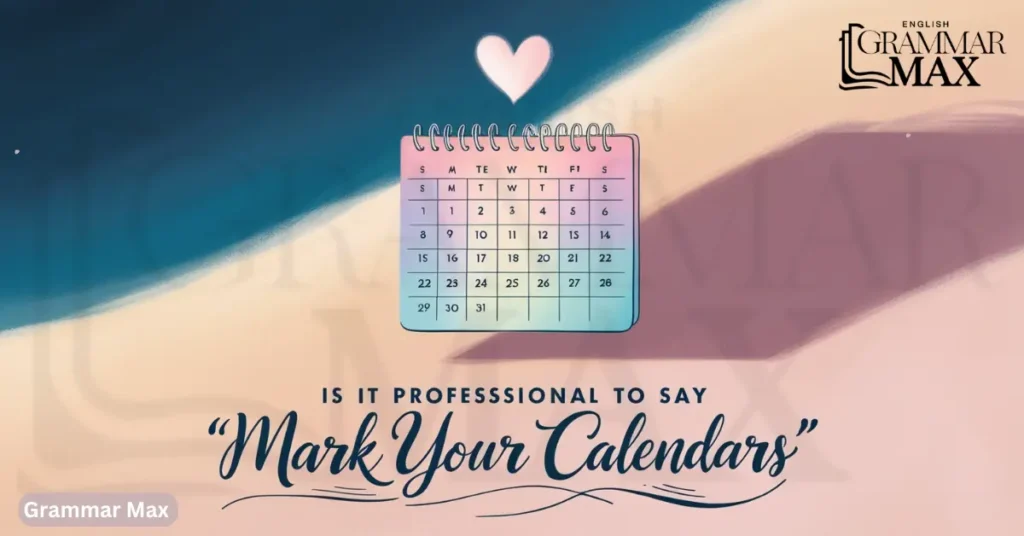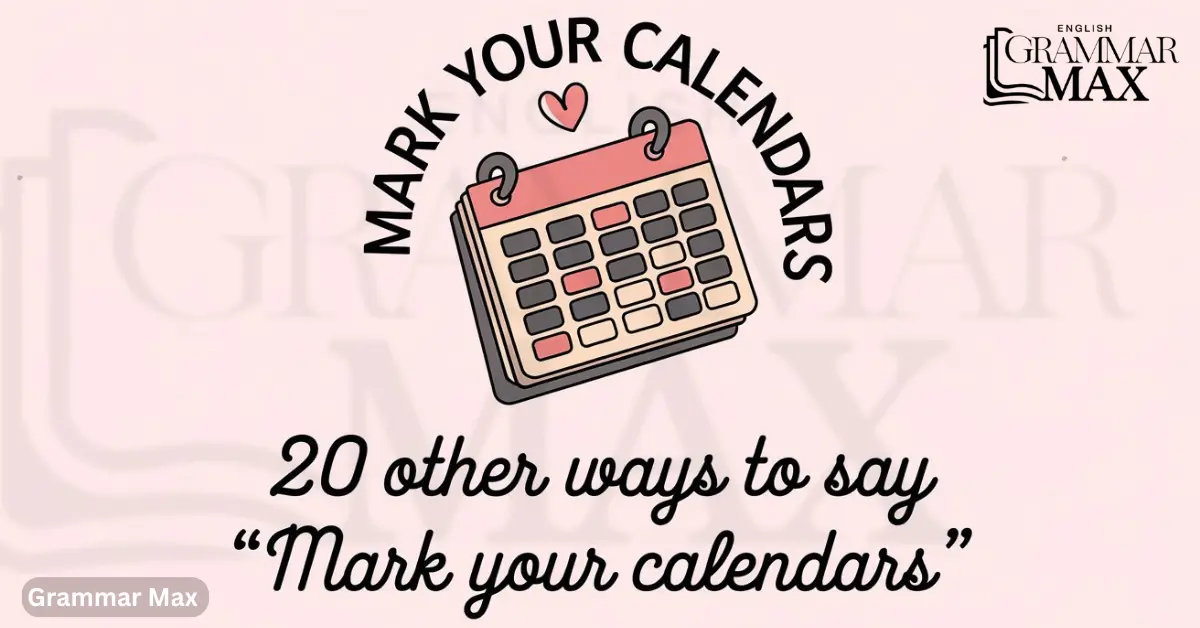Mark your calendars is a phrase we often hear when someone wants us to remember an important date. Whether it’s for a crucial event, a key meeting, or a formal event, this expression encourages us to make a note of an upcoming occasion. However, in professional settings, there are many other ways to convey the same message in a polished and engaging manner. Whether you’re sending a wedding reminder or planning a must-attend business conference, there are numerous alternatives that can help capture attention and ensure that no one forgets to mark on their calendar.
We’ll explore 20 other ways to say “Mark Your Calendars” and provide examples for each to help you communicate with clarity and professionalism. These phrases will be useful in scenarios ranging from sending an event reminder to ensuring participants commit to a date. By the end, you’ll have plenty of alternatives to make your invitations and reminders stand out!
Alternative Ways to Say “Mark Your Calendars”

You can use these ways instead to say “Mark Your Calendars”:
- Save the Date
- Set a Reminder
- Pencil It In
- Lock It In
- Block Off Your Schedule
- Keep the Date Free
- Reserve the Date
- Hold the Date
- Make a Note of It
- Clear Your Schedule
- Put It in Your Planner
- Jot It Down
- Add It to Your Calendar
- Note the Date
- Plan for It
- Lock in the Date
- Keep the Day Free
- Put It on Your Calendar
- Remember the Date
- Schedule It In
Save the Date
Save the Date is a widely used phrase, especially for formal events like weddings, conferences, or important meetings. It politely asks the recipient to mark their calendar for an upcoming event.
This phrase highlights the event importance and ensures that attendees will reserve the date well in advance. Using “Save the Date” adds a touch of formality and shows that the event is something they can’t miss.
Example:
“Hi Sarah,
We are thrilled to announce our annual leadership summit. Please save the date March 15th and stay tuned for more details. This will be a must attend event.
Best,
John”
Set a Reminder
Set a Reminder is a direct and professional way to ensure someone notes an important date or event. It emphasizes the need to use a reminder tool, like a digital calendar, to stay updated.
This phrase is particularly useful in formal contexts where the event importance is high, such as a key meeting or an upcoming event that requires attention. It suggests taking action to avoid forgetting the date.
Pencil It In
Pencil It In is a casual way of asking someone to tentatively reserve a date without making a firm commitment. It implies that the event is important, but the details might still be flexible.
This phrase is especially useful when the date is not yet finalized, as it allows for changes if necessary. In fact, it’s often used in professional settings for events that might shift, yet still require initial calendar planning. Additionally, it helps maintain flexibility while ensuring attention to upcoming events.
Best Use:
“Pencil it in” is ideal for suggesting a tentative date when plans are not yet finalized, allowing for flexibility in scheduling. It conveys that the event is important but still subject to change.
Example:
“Hello Mark,
We’d like to tentatively schedule a brainstorming session for Friday, October 1st. Please pencil it in, and I’ll confirm the exact time by next week.
Best,
James”
Lock It In
When you say “lock it in,” you emphasize that a date or event is confirmed and should be prioritized. This phrase conveys a sense of commitment, indicating that all details are finalized and attendees should ensure their availability.
It’s a strong reminder to treat the date as fixed, eliminating any uncertainty about the scheduling. Using this phrase can enhance the professionalism of your communication, especially in business settings.
Best Use:
For high priority events where attendance is essential, such as executive meetings or key presentations. It underscores the need for recipients to treat the date as unchangeable
Block Off Your Schedule
Block Off Your Schedule is a directive that emphasizes the need to prioritize a specific date or event. It suggests that the recipient should clear their calendar of other commitments to make room for what is being planned.
This phrase is often used for high priority events or meetings that are considered essential. By using it, you convey the importance of the event, ensuring that attendees understand that their participation is not just encouraged but expected.
Keep the Date Free
This is a polite and flexible way to request someone to avoid scheduling anything else on a given date. It suggests that the event may not require full commitment yet but should be considered important.
Best Use:
“Keep the date free” is effective for informal event invitations where you want attendees to avoid scheduling other commitments. It suggests that the event is important while allowing for flexibility regarding the final details.
Example:
“Hi Emma,
We’re planning a team outing for September 25th. Could you keep the date free? More details to follow!
Cheers,
Tom”
Reserve the Date
Reserve the Date is a phrase commonly used for formal events where a specific date needs to be set aside for attendance. It conveys a sense of urgency and importance, encouraging recipients to prioritize their schedules.
This expression is often seen in invitations for weddings, conferences, or significant gatherings, signaling that further details will be provided later. By asking attendees to reserve the date, you ensure that they understand the necessity of committing their time to the upcoming event.
Hold the Date
Hold the Date is a polite phrase that informs recipients to keep a specific date available for an upcoming event. It signals that while details may still be pending, the date is significant and should remain free from other commitments.
This approach creates anticipation and prepares attendees for more information to come. Using this phrase shows consideration for their time while emphasizing the event’s potential importance.
Best Use:
This phrase is ideal for tentative events where details are still being finalized. It works well in both professional and informal settings when you want to keep your audience informed without overwhelming them with specifics.
Make a Note of It
Make a note of it is a casual yet effective phrase that reminds someone to remember an important date or event. It encourages recipients to actively add the date to their planner or calendar, ensuring they don’t forget about it.
This phrase proves versatile and suits both informal and formal contexts, thereby making it a great choice for a wide range of communications. Furthermore, using this expression conveys a sense of urgency while also maintaining a friendly tone, which in turn makes it easy for recipients to grasp its importance. As a result, it works effectively in various scenarios.
Example:
“Hi Kelly,
We have a team lunch next Wednesday. Could you make a note of it for 12:30 PM?
Thanks,
Sam”
Clear Your Schedule
Clear Your Schedule is a direct and assertive phrase that requests someone to cancel plans or rearrange commitments to prioritize an important event. It implies that the upcoming occasion is significant and should take precedence over other activities.
This phrase works particularly well in professional settings when you need to convey the urgency of a key meeting or critical gathering. By urging someone to clear their schedule, you emphasize the necessity of their presence and ensure the event receives the attention it deserves.
Best Use:
“Clear your schedule” is most effective when conveying urgency for a high-priority meeting or event that requires full attention and presence. Moreover, it emphasizes the importance of prioritizing this event over other commitments. In addition, it signals to recipients that their participation is essential, therefore urging them to make necessary adjustments.
Example:
“Hi Team,
We have an emergency strategy meeting tomorrow at 9 AM. Please clear your schedule and be ready to discuss the new direction.
Best,
Anna”
Is it Professional to Say “Mark Your Calendars”?

Yes, it is professional to say “Mark Your Calendars” in most formal and business contexts. This phrase is commonly used to inform colleagues or clients about an upcoming event or a crucial meeting. It serves as a reminder tool to ensure that important dates are noted. However, depending on the formality of the event, alternatives like “Save the Date” or “Set a Reminder” may sound more polished for high level business communications. Overall, marking your calendar emphasizes the event importance and ensures that it is a must attend for the recipients.
Frequently Asked Question
What to say instead of mark your calendar?
You can use phrases like “Save the date,” “Set a reminder,” or “Pencil it in” as alternatives to “mark your calendar.”
What does it mean to mark your calendar?
To mark your calendar means to note an important date to ensure it is remembered and prioritized for an upcoming event.
How do you mark your calendar on iPhone?
To mark your calendar on an iPhone, open the Calendar app, tap the “+” icon, fill in the event details, and tap “Add” to save.
What does mark your schedule mean?
To mark your schedule means to indicate a specific time for an event, emphasizing its importance and ensuring commitment to being available.
Conclusion
“Mark your calendars” can be creatively rephrased in various ways to better suit different contexts or audiences. Alternatives like “Save the date,” “Don’t miss it,” or “Set a reminder” offer simple yet effective options for casual or formal situations. These phrases maintain the intent of ensuring people remember important events while adding a fresh twist to the message.
More expressive phrases such as “Jot this down,” “Highlight this date,” or “Keep this on your radar” emphasize urgency or significance. They allow for flexibility in tone, helping to tailor reminders based on the level of importance or the relationship with the audience.

William Henry is a writer for Grammar Max, a blog that focuses on synonyms and phrases. He loves exploring the quirks of the English language and enjoys helping readers improve their vocabulary. William’s articles are easy to read, fun, and full of useful tips for anyone looking to better understand and use English. Whether you’re a student, a professional, or just someone interested in language, William’s writing on Grammar Max makes learning about words and their meanings simple and enjoyable.
